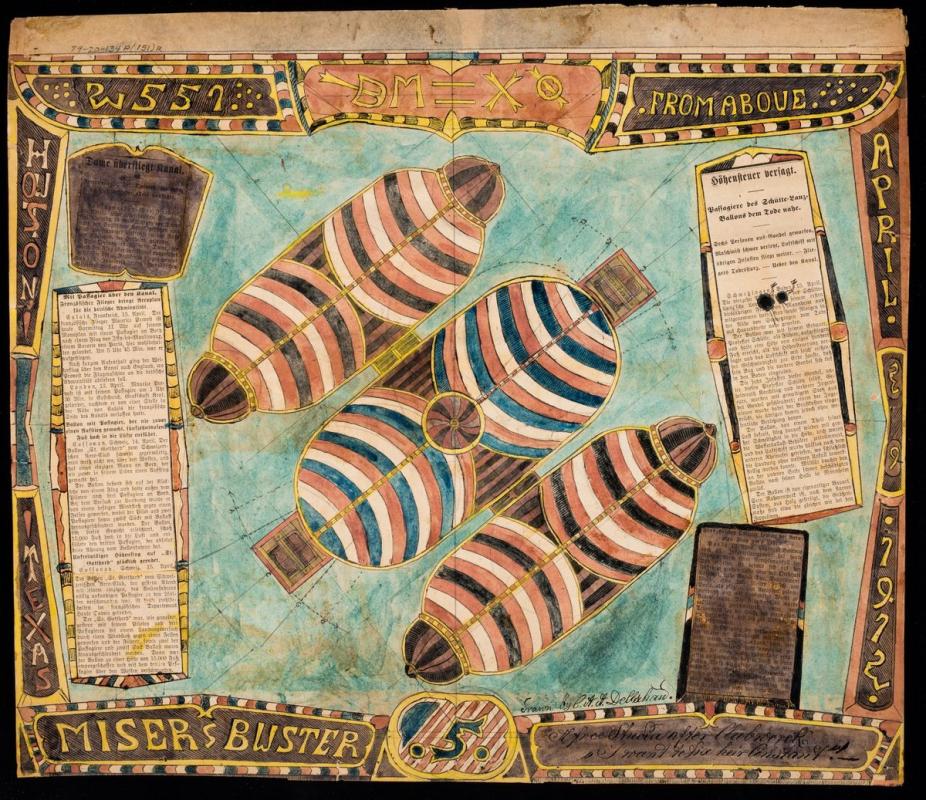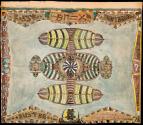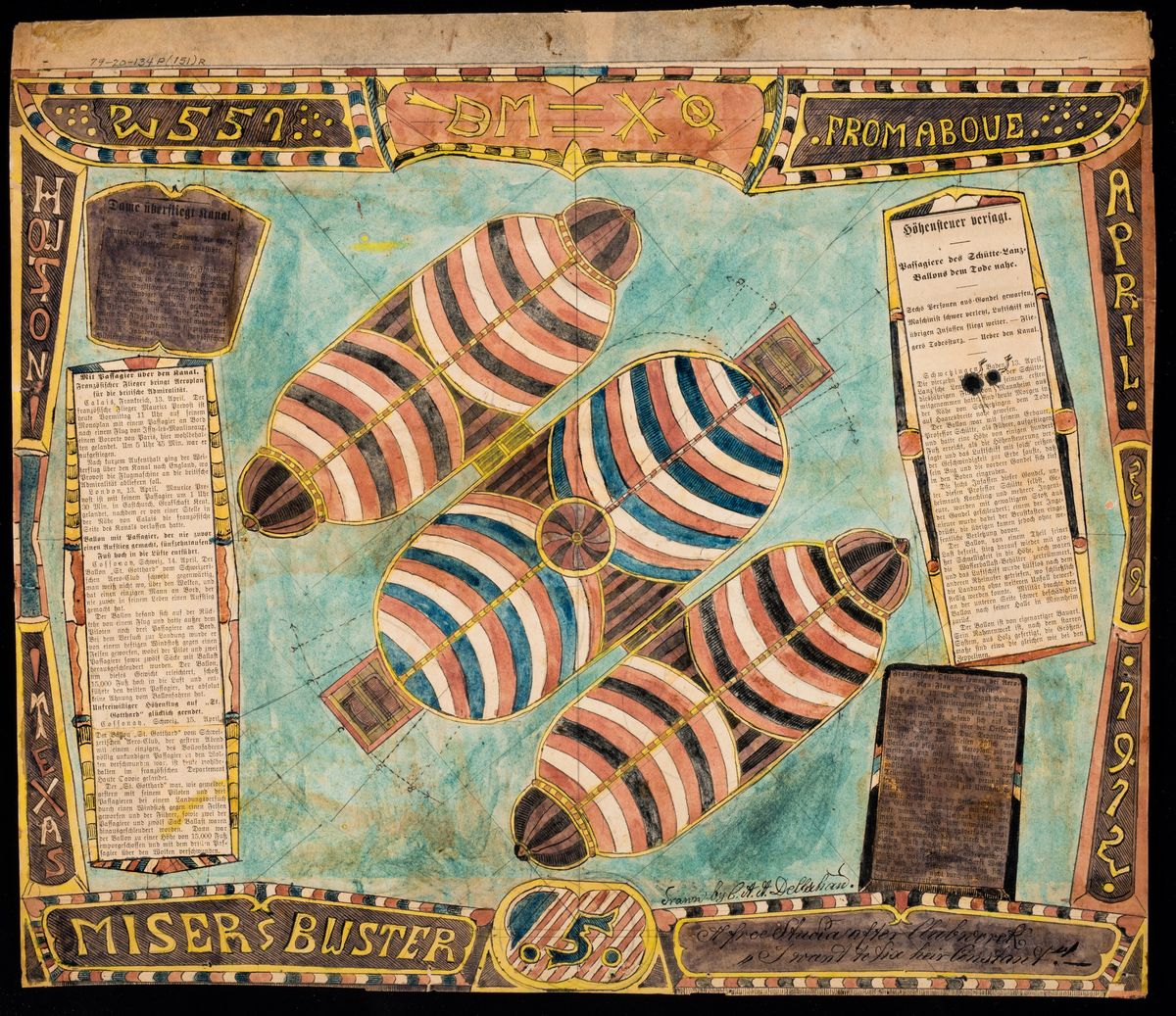Misers Buster From Above
Artist:
Charles A.A. Dellschau
(American, born Prussia, 1830 - 1923)
Date: April 29-May 1,1912
Dimensions:
16 5/8 × 19 1/4 in. (42.2 × 48.9 cm)
Credit Line: Purchased with funds provided by The Annual Gift Appeal
Object number: 79.20.151
Signed: Lower right recto: drawn by C. A. A .Dellschau
Lower right verso: drawn by C. A. A. Dellschau
Inscribed: Recto:
Lower right: drawn by C. A. A. Desllschau. A free Studia after Clubworck. I want to fix heir Constant.
Lower left: Misers Buster
Lower center: 5
Upper left: 2551
Upper center: DM=XØ
Upper right: From Above
Left side: Houston Texas
Right side: April 29 1912
Verso:
Upper left: 2552
Upper center: DM=XØ
Upper right: From Below
Lower right: Clubworck drawn by C. A. A. Dellschau
Lower left: Buster
Left side: Houston Texas
Right side: May 1 1912
Label Text
Renaissance paintings show saints and angels floating or flying around amid clouds in the same skies where Dellschau’s angelic Aeros are suspended light as a feather.
–Thomas McEvilley (American, 1939–2013), critic, poet, novelist, and scholar
Between 1908 and 1921, Charles Dellschau—a German immigrant, retired butcher, and supposed former Sonora Aero Club member—created twelve large, hand-bound books with more than 2,500 drawings related to airships and the development of flight. Stored in the attic of a family home in Houston, Texas, these fascinating works were not discovered until the 1960s, when they were dumped on a sidewalk and salvaged by a junk dealer, after miraculously surviving a fire. While it has never been proven that the Sonora Aero Club existed in Sonora, California, during the Gold Rush (1848–1855), it is clear that this artist possessed a great imagination. Dellschau’s collages document the men and the machines they dreamed up at secretive club meetings dedicated to the discussion of flight exploration, a new frontier during the period when Dellschau created these works. However, his fantasies were not unhinged from reality; they were layered on top of it. Dellschau’s detailed, annotated mixed-media images of heroic flying machines—Barnum & Bailey, Buck Rogers, and Jules Verne all stirred together—are interspersed with collaged pages (which the artist referred to as “press blooms”) featuring thousands of newspaper clippings related to the political events and technological advances of the period.
(Suzanne Weaver, 2019, Group Label)
–Thomas McEvilley (American, 1939–2013), critic, poet, novelist, and scholar
Between 1908 and 1921, Charles Dellschau—a German immigrant, retired butcher, and supposed former Sonora Aero Club member—created twelve large, hand-bound books with more than 2,500 drawings related to airships and the development of flight. Stored in the attic of a family home in Houston, Texas, these fascinating works were not discovered until the 1960s, when they were dumped on a sidewalk and salvaged by a junk dealer, after miraculously surviving a fire. While it has never been proven that the Sonora Aero Club existed in Sonora, California, during the Gold Rush (1848–1855), it is clear that this artist possessed a great imagination. Dellschau’s collages document the men and the machines they dreamed up at secretive club meetings dedicated to the discussion of flight exploration, a new frontier during the period when Dellschau created these works. However, his fantasies were not unhinged from reality; they were layered on top of it. Dellschau’s detailed, annotated mixed-media images of heroic flying machines—Barnum & Bailey, Buck Rogers, and Jules Verne all stirred together—are interspersed with collaged pages (which the artist referred to as “press blooms”) featuring thousands of newspaper clippings related to the political events and technological advances of the period.
(Suzanne Weaver, 2019, Group Label)
Not on view
In Collection(s)
The San Antonio Museum of Art is in the process of digitizing its permanent collection. This electronic record was created from historic documentation that does not necessarily reflect SAMA's complete or current knowledge about the object. Review and updating of such records is ongoing.




 This resource has been made possible in part by the National Endowment for the Humanities: Exploring the Human Endeavor.
This resource has been made possible in part by the National Endowment for the Humanities: Exploring the Human Endeavor.
